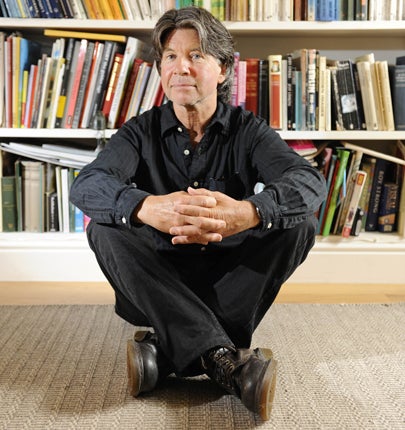Restore creativity in classroom, says Laureate
Anthony Browne calls for art to be given an even footing with reading

New children's Laureate Anthony Browne is launching a campaign to bring back creativity to the classroom by getting children to draw.
The children's books' illustrator and author, who took over his new post last month, is concerned that because of the pressure of national curriculum tests, priority is given to reading at the expense of drawing.
He believes that they should be on an even footing and argues that the current status will lead to a dearth of artists in the future. Mr Browne, 62, wants one day to be set aside every year for millions of children to play a game that would encourage art.
Based on something he used to play as a child, he has dubbed it "the shape game". Each pupil would draw a shape and then pass it on to another to develop as an illustration or drawing.
"When I was young I thought my brother and I had invented [the game]," Mr Brown said. "Then I discovered lots of other people were playing it – but didn't call it that.
"Each child can transform [the abstract shape] into something different.
"Nobody's ever talked about it but it's a simple game which I believe is the essence of creativity. I've got nothing against reading but the two (reading and drawing) should go side by side.
"What I'd really like to do is get as many people as possible all playing the shape game on the same day. Parents and children could draw together."
He said that another advantage to his idea, in addition to encouraging drawing, would be that there were no winners or losers. "You can say to a child 'Ah, I can see what you've drawn there' or 'No, you've beaten me – well done – I can't see that'," Mr Browne said.
Leonardo da Vinci used to talk about an old wall and say he could see battles and people and landscapes, Mr Browne added. "You can say to a youngster 'If you play the shape game, you can become an artist or a writer'," he added.
Some of the best drawings could be published in a book, in order to better motivate children, he said.
Mr Browne is not the first Children's Laureate to speak out about his or her ideas of what should be happening in the classroom. Former laureate Michael Rosen used the post to campaign for more creativity in the curriculum and against the national curriculum SATs regime of tests for seven, 11 and 14-year-olds which, he said, was elbowing creativity out of the curriculum.
Mr Browne shares some of his views but insisted that he would not follow the same route. However, he did say that he believes some forms of creativity had been stifled by the contemporary approach to schooling. Another of his plans is to mount an exhibition of children's book illustrations and paintings – probably based in a London museum – so that children could see the value of drawing. Ideally, the exhibition would then be moved to different parts of the country.
In his first few weeks in the post, which was set up by the reading charity Booktrust, he has become embroiled in the controversy over children's authors being forced to undergo vetting before they can work in schools. Philip Pullman, Anthony Horowitz and Michael Morpurgo are among a number who have said they will boycott working in schools rather than undergo vetting.
But Mr Browne, who will hold the post of Children's Laureate for two years, disagrees with them. "Why should we be special?" he said. "I just found the views that Philip Pullman et al were making were arrogant – saying it was an insult to suggest to that we might have abused children.
"Peripatetic music teachers and dinner ladies have to undergo this vetting. Why shouldn't we?"
Join our commenting forum
Join thought-provoking conversations, follow other Independent readers and see their replies
Comments
Bookmark popover
Removed from bookmarks